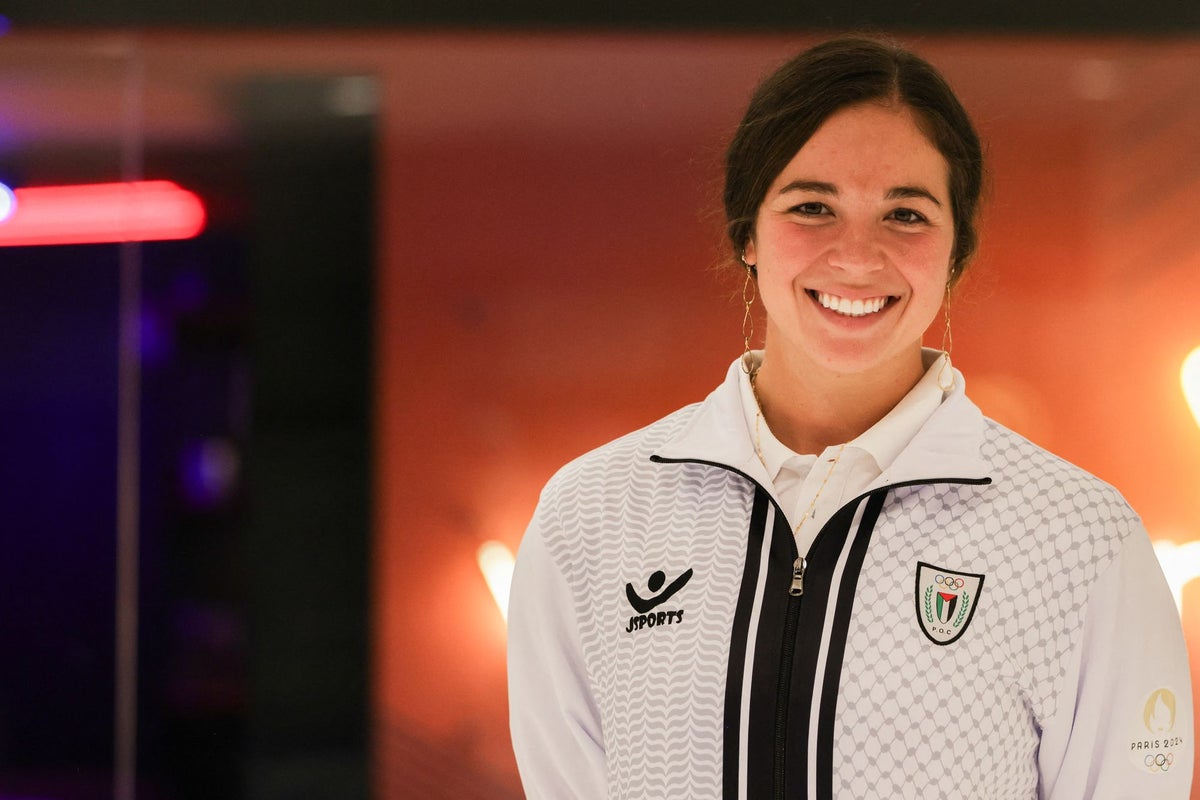During last summer’s Paris Olympic Games, Palestine’s flagbearer Valerie Tarazi couldn’t walk through the Village without being hassled, “to the point where it was actually an issue,” the swimmer recalls.
The reason was unusual. Every nation at the Games had its own unique pin badge and, for athletes living in the Olympic Village, collecting all 200-odd was one way to pass the time. It became a popular game, and it turned athletes of the smallest nations into minor celebrities, with a limited number of rare pins to give away.
“We were actually getting annoyed,” she laughs. “Because Palestine’s pins were so sought-after, we had people bombarding us all the time. And I was just trying to walk to do something, to go eat – like, I’m trying to eat, stop asking me for pins!”
Tarazi has a beaming smile and wears the Palestinian flag with pride, often using her body as a canvas for face paint and nail varnish, so perhaps it is not surprising that she felt the love wherever she went in Paris. She tells a story of making friends with members of the New Zealand women’s rugby team in the Village food hall. After New Zealand won their gold medal match, the players phoned Tarazi from their party bus.
“I got a call at 10.30 at night saying, ‘Val, we just won, you’ve got to come celebrate with us.’ I was like, ‘What?! I race in 36 hours, I cannot go out right now’.” So the Kiwis came and met her at 7am the next morning. “The whole team came, dressed in full gear, they had their gold medals around their necks and they gave me their game-winning jersey, all signed. And when I raced my race, I got a video afterwards of them all sitting on a bus watching me swim.”
Tarazi is speaking to The Independent over video call from the Islamic Solidarity Games in Riyadh, a condensed version of the Olympics involving 57 nations competing over 21 different sports, more akin to the Commonwealth Games. Participating countries are members of the Organisation of Islamic Cooperation, which carries the stated goal of bringing together countries of the Muslim world.
She is speaking two days after winning a dramatic bronze medal in the 200m individual medley, edging two rival swimmers to the wall. Standing on the podium was emotional at a time when members of her extended family and their communities are suffering.
“I come from one of the oldest families in Palestine, so, unfortunately, I have a lot of family stuck in Gaza right now. My house is in [south] Gaza, and thank God, last we heard, it’s still standing, which is crazy. We don’t have a lot of communication just because things are what they are right now.”
Athletes of all faiths and backgrounds compete at the Islamic Solidarity Games and Tarazi has been warmly welcomed in Riyadh this month, just as she was in Paris. “We have volunteers signing Dammi Falastini every single time we walk in the Village. It’s very heartwarming, because through all the chaos in the world – it’s just not getting better – but we know that we have the love and support to bring a smile to our face in some dark times.”
Tarazi grew up in Illinois and shone racing for Auburn University in Alabama. The 26-year-old qualified for Palestine through her grandparents and committed to representing the nation two years ago, when she competed at the Arab Games.
“People are always like, ‘You didn’t represent Team USA because you weren’t good enough’,” she says. “I’m like, well, actually at 15 years old I was 68th in the US but I was top 100 in the world, so I was still very elite at a very young age. I like to throw that out there because I don’t like people to think, ‘Oh, well it was easier to make Team Palestine’. No, I always wanted to represent Palestine, it was just really difficult on how to do that.
“One, because how do you prove you’re Palestinian when my family’s been there since literally the year 400? We don’t have deeds to our land. It’s just our land. So my parents figured out the paperwork, and with my last name being a very old Palestinian name [Tarazi is a Christian clan], it wasn’t a huge question, but it was just getting in contact with the right people.”
Through her life as a swimmer, she has discovered fellow Tarazis all over the world. “We’re very deep-rooted everywhere and it’s really funny because I’m big on Instagram, so wherever I go I try and update, like, ‘Here are my next three travel plans’, because I like when people reach out. I had Tarazi family in Paris, in Dubai, in Riyadh, all reach out to me like, ‘Oh we need to meet up’. I was in Australia this summer on family vacation and Tarazis were like, ‘We have to meet you!’”
She was honoured to carry the flag at the Olympic opening ceremony on the River Seine, as one of eight athletes from Palestine. “There’s a picture of all of us on the boat with no smile on our face, and it was our way of showing the world that we’re here and we’re strong and we’re present, but we’re not here celebrating. We are here to represent all of those people in the world who have died and been murdered and everything in between. That’s not, ‘Oh my gosh, look at us’. No, we’re the face of the country, we have the honour of being there.”
She has found her first Islamic Games just as inclusive, despite being Christian. “Christians and Muslims have so much in common and are so welcoming. I think actually some of the best people I’ve ever met in my life are from, in general, the Middle East – the nicest, kindest people. So there’s never a ‘Oh, why is Valerie competing at the Games, she’s Christian’. No, we are here to welcome everyone.”
And this is her message, that sport can be a powerful force for good, a beacon of light in the darkness. Her experiences representing Palestine, and the reactions she has felt all over the world, have taught her that.
“I always say the biggest honour that I could ever have is raising a flag and being the voice of the Palestinians when a lot of Palestinian voices just don’t get heard. For some reason, being an athlete makes us very humane, and … sports unites all. It’s like the one common factor that no matter what walk of life you’re in, no matter your background, that’s what you have in common. If that makes us humane, then it’s a way of uniting us.”









